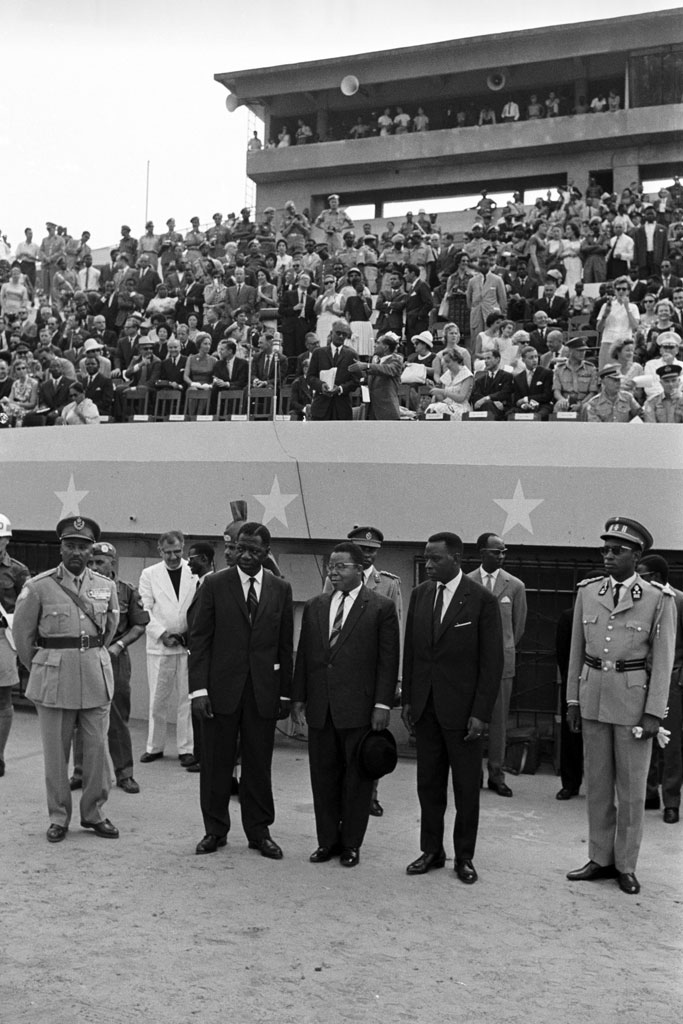Character Sketches: Mobutu and Tshombe – Two Congolese Rogues by Brian Urquhart

Joseph-Desiré Mobutu, 32 years the president of Zaire (Congo), and Moise Tshombe, the first and only president of the secessionist state of Katanga, were two of the most active members of the independence generation in Africa. Mobutu was the smarter and more unpleasant, and during his time in office he managed to destroy the third largest – and potentially the richest – country in Africa. Moise Tshombe’s career was shorter, but his leading role in the 1960 secession of the mining province of Katanga did much to sabotage what promise there was for the future of the Congo.
When I first met Mobutu in July 1960, he was Prime Minister Patrice Lumumba’s chief military assistant and had just promoted himself from sergeant to lieutenant-colonel. By comparison with his boss, Mobutu was a pillar of pragmatism and common sense. It was to him that we appealed when our people were arrested by Lumumba’s hashish-stimulated guards. It was he who would bring up, in a disarmingly casual way, Lumumba’s most outrageous requests – that the UN should, for example, meet the pay roll of the potentially mutinous Congolese army. In those early days, Mobutu seemed a comparatively sensible young man, one who might even, at least now and then, have the best interests of his newly independent country at heart.
In early September, 1960, after President Kasavubu dismissed Lumumba and vice versa, rumor and panic swept Leopoldville, and our headquarters was jammed with all sorts of people seeking advice, protection, help, or a way to get out of the Congo. Unexpectedly, Colonel Joseph Mobutu appeared in this crowd. He was dressed in civilian clothes and told us that he was disgusted with recent events and wanted our help in leaving the country. Rajeshwar Dayal, the newly-arrived head of our operation and I exhorted Mobutu to stand by his fledgling nation in its hour of need. He may well, I realized later, have misinterpreted this boy scout approach. None of us had yet fully cottoned on to Mobutu’s ambition and his exceptional eye for the main chance.
Two days later, Mobutu, who as far as we knew, was still Lumumba’s chief military aide, appeared once again at our headquarters, this time in uniform. He said he was tired and nervous and needed a quiet place to relax. Our office was already jammed with jittery suppliants, so I put him in my bedroom. At his request, I lent him a radio, adding half a bottle of whiskey to cheer him up. Some time later, I looked in on our uninvited guest. He seemed to be enjoying the whiskey all right, as Radio Leopoldville continued to play the cha cha cha. But then the music stopped, and a voice was heard to say that he was suspending the president, the prime minister and the parliament and taking over the country.
“C’est moi!” Mobutu exclaimed, triumphantly pointing to the radio. “C’est moi!”
I don’t know when I have been more irritated. I told Mobutu that if he wanted to make a coup d’etat, the place for him was in the streets with his followers, not listening to the radio under false pretenses in someone else’s bedroom. We then threw him out.
Mobutu’s action, almost certainly masterminded by the Americans, was totally unconstitutional. Thus, much to the annoyance of Washington, Dag Hammarskjold and his representatives in the Congo refused to recognize him in his new, self-appointed role.
The US and British Ambassadors in Leopoldville strongly disapproved of our reaction to Mobutu’s coup, arguing that Mobutu was a sincere anti-communist and the best hope for the future of Congo. When I said that I thought that Mobutu was principally the best hope for Joseph Mobutu, and that anyhow we were supposed to support the democratically elected Congo government whether we liked the prime minister or not, the diplomats were even more annoyed. Mobutu would remain the darling of the United States.
I only once saw Mobutu again after I left the Congo – at a meeting of the UN General Assembly in New York. By this time he had become Mobutu See Seko Kuku Ngbendu – which translates variously as “The all-powerful warrior who goes from conquest to conquest leaving fire in his wake,” or “The cock who leaves no hen alone.” With his trademark leopard-skin cap and carved wooden staff, and a Boeing 747 to carry his entourage, he was indeed the Great Dictator. We came face to face at a reception, and Mobutu beamingly recalled our acquaintance during the early days of the Congo’s independence. “You were very unkind to me the last time we met,” he said.
In 1997, Mobutu, dying of cancer and with his vast country in shambles, was at last deposed by a very different yet ineffective ruler, Laurent Kabila. The looting of Mobutu’s many palaces revealed the sordid and infinitely dreary excesses of a hollow man infatuated with power and money.
Moise Tshombe was less of a monster than Mobutu, and he didn’t need to go in search of money. The Union Minière, a fabulously wealthy mining consortium, had found in him, a distinguished-looking and malleable hereditary chief, the ideal cover for their plans to continue making enormous profits in Katanga in spite of Congolese independence. At independence, Tshombe had become President of the province of Katanga, and ten days later, with Belgian connivance, he declared it an independent state.
Joseph Mobutu and Moise Tshombe were two Congolese leaders who played key roles in the history of their country, especially after it was freed from colonial rule by Belgium in 1960. In the ensuing years following independence, the country was violently affected by political upheaval, civil unrest and secessionist movements – both Mobotu and Tshombe came to widespread prominence during this time; the former as an assistant to Patrice Lumumba, the country’s prime minister at independence and, eventually, as the country’s president; the latter, as the head of the mineral-rich province of Katanga, which attempted to secede from the newly-independent Congo. Mobotu ruled his country for country for decades until his ouster in 1997. Tshombe was to become his country’s prime minister before later dying in exile in 1969.
The mining consortiums and the Belgian government paid Tshombe large sums of money, much of which went straight into his Swiss bank account. They also provided him with European advisers who quickly built up around him a farcical version of the panoply of state. He had a presidential guard modeled on the French Garde Nationale, with plumed helmets and swords, but since the Katangese guardsmen were mostly very short, the statement created an unforgettably comic effect. Tshombe himself had the best-cut suits that London and Paris could provide. His advisers saw to it that Katanga got a national flag, an airplane, its own postage stamps and currency, and a patriotic anthem with the rousing refrain:
Enfants du Katanga, jusqu’à la mort,
Defendez le bien! Defendez le fort!
Avec vos bras et votre sang!
Avec vos dents!
Markpress, a Geneva-based public relations firm, portrayed Tshombe to the world as a civilized, anti-communist, popular, pro-Western leader who would save the Congo not only from the archfiend Lumumba, but from Communism and the United Nations as well. Tshombe’s advisers enlisted U.S. Senator Thomas Dodd of Connecticut as his Washington drum-beater.
After the UN succeeded in getting the Belgians troops out of Katanga, Tshombe’s so-called “militia” was run by undercover Belgian officers and white mercenaries. They were a group made up of disaffected French paratroops from Algeria and the riff raff of the other dissolving colonial empires, variously motivated by greed, by addled notions of racial superiority, and by a love of violence and trouble in someone else’s country at someone else’s expense. Tshombe had plenty of money to pay them handsomely.
As long as Katanga remained separate, the rest of Congo would never settle down and, as the majority of the governments in the UN were strongly opposed to the secession, a solution had to be found. In the absence of a forceful military operation, we had to make do with negotiation and a non-forceful peacekeeping force. After Lumumba’s death, the Security Council authorized the UN troops to use force to prevent or to arrest foreign mercenaries. In November 1961, after military and diplomatic efforts had both failed and Hammarskjold had been killed in an aircrash on his way to talk to Tshombe, I was sent to Katanga to try once again to bring Tshombe and the central government together.
On my first evening in Katanga, at a dinner in honor of Senator Dodd, I was kidnapped and severely beaten by Tshombe’s soldiers. Tshombe was forced to use all his influence to get me released, so our first meeting, two days later, started in a somewhat strained atmosphere. He was courteous and solicitous about my health, and seemed surprised that, because I had more important things to talk about, I had no wish to discuss my kidnapping.
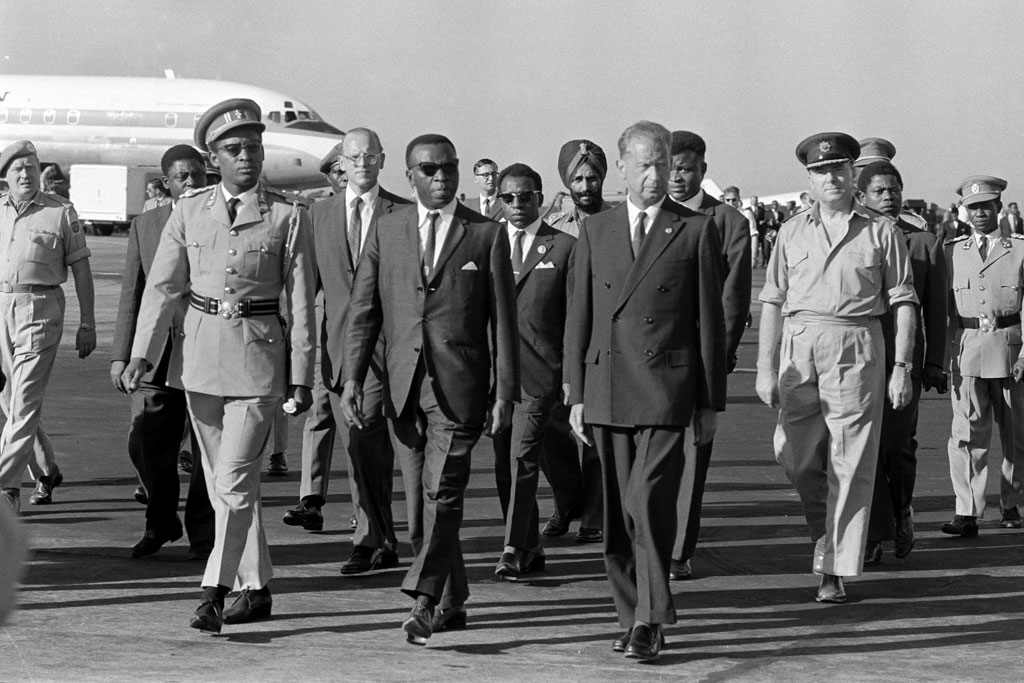
13 September 1961 – Joseph Mobutu’s dealings with the United Nations initially arose from his role as an assistant to the first democratically-elected Prime Minister of the Republic of the Congo, Patrice Lumumba, who eventually appointed him Chief of Staff of the Armie Nationale Congolaise. With the events in the Congo a top priority for the international community, UN Secretary-General Dag Hammarskjöld made several visits to the country. Shown here, Hammarskjöld (right, foreground) inspects a Guard of Honour at Njili Airport shortly after his arrival in the capital, then known as Leopoldville. At centre is Prime Minister Cyrille Adoula and, at left, Colonel Mobutu. UN Photo/BZ
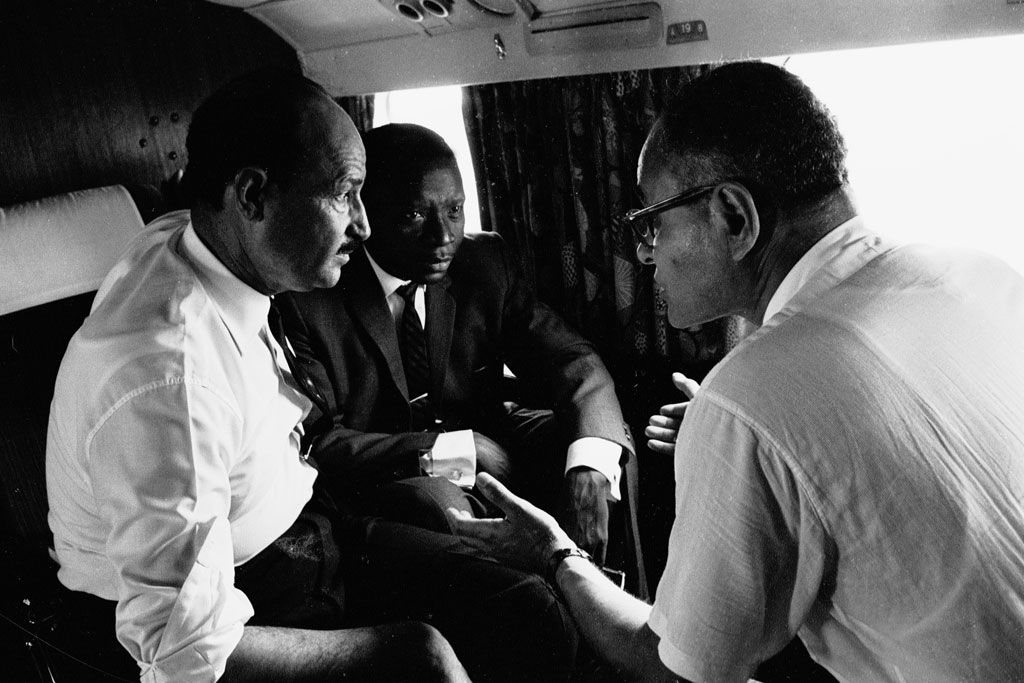
19 December 1961 – Led by Moise Tshombe, the mineral-rich Congolese province of Katanga sought to secede from the Republic of Congo shortly after the latter’s independence in 1960. The United Nations was heavily involved in efforts to resolve the situation. Shown here, the UN Under-Secretary for Special Political Affairs, Raplh Bunche (right) exchanges views with Prime Minister Cyrille Adoula (centre) of the Republic of the Congo’s central government and a colleague. The men were on an aircraft flying them to the town of Kitona, in the country’s southwest, for talks at a UN-run airbase with President Tshombe of Katanga Province. UN Photo/BZ

21 December 1961 – Organized by ONUC and others, Prime Minister Cyrille Adoula and Moise Tshombe, the self-styled President of Katanga, met at the UN-run airbase at Kitona, in the country’s southwest, to discuss ways to resolve differences over Katanga province’s secessionist aims. Seated second from right, accompanied by officials from the breakaway province, is President Tshombe. On the opposite side of the table are officials from the Congo’s central government, including Prime Minister Adoula (second from left). At the centre of the table are the UN Under-Secretary for Special Political Affairs, Ralph Bunche, and the US Ambassador to the Congo, Edmund Gullion. UN Photo/BZ

26 March 1962 – Peacekeepers from the UN Operation in Congo (known by the French acronym ONUC) were deployed in the Congo in 1960 to ensure the withdrawal of Belgian forces, restore law and order, and provide technical assistance. Shown here, the parade master of the Armie Nationale Congolaise salutes guests at a farewell parade for ONUC’s military commander in Leopoldville. Among the guests is Colonel Mobutu (immediately in front of the flagpole). UN Photo/BZ
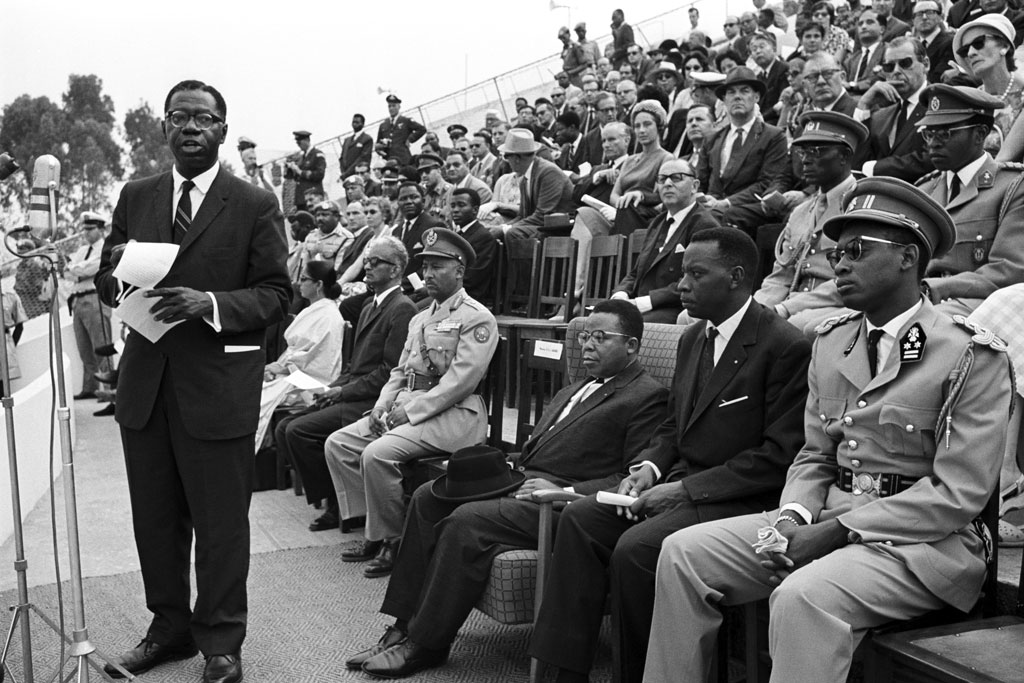
17 September 1962 – Along with several colleagues, UN Secretary-General Dag Hammarskjöld was killed in a plane crash while on a peace mission in the Congo. Shown here is a memorial parade held in Leopoldville for the late UN chief and colleagues who lost their lives. Shown here attending the event are members of the diplomatic corps, UN personnel and government officials – the latter includes (right to left): Colonel Joseph Mobutu, Prime Minister Cyrille Adoula and President Joseph Kasavubu. UN Photo/BZ

17 September 1962 – Along with several colleagues, UN Secretary-General Dag Hammarskjöld was killed in a plane crash while on a peace mission in the Congo. Shown here is a memorial parade held in Leopoldville for the late UN chief and colleagues who lost their lives. Shown here attending the event are members of the diplomatic corps, UN personnel and government officials – the latter includes (right to left): Colonel Joseph Mobutu, Prime Minister Cyrille Adoula and President Joseph Kasavubu. UN Photo/BZ

10 August 1970 – By 1970, Colonel Mobutu had become his country’s president. In this role, he paid an official visit to UN Headquarters in New York and was guest of honour at a l17 September 1962 – Along with several colleagues, UN Secretary-General Dag Hammarskjöld was killed in a plane crash while on a peace mission in the Congo. Shown here is a memorial parade held in Leopoldville for the late UN chief and colleagues who lost their lives. Shown here attending the event are members of the diplomatic corps, UN personnel and government officials – the latter includes (right to left): Colonel Joseph Mobutu, Prime Minister Cyrille Adoula and President Joseph Kasavubu. UN Photo/BZ

10 August 1970 – By 1970, Colonel Mobutu had become his country’s president. In this role, he paid an official visit to UN Headquarters in New York and was guest of honour auncheon given by Secretary-General U Thant. Shown here, President Mobutu presents Secretary-General Thant with a portrait of himself, while observed by the UN Under-Secretary-General for Special Political Affairs, Ralph J. Bunche. UN Photo/Yutaka Nagata
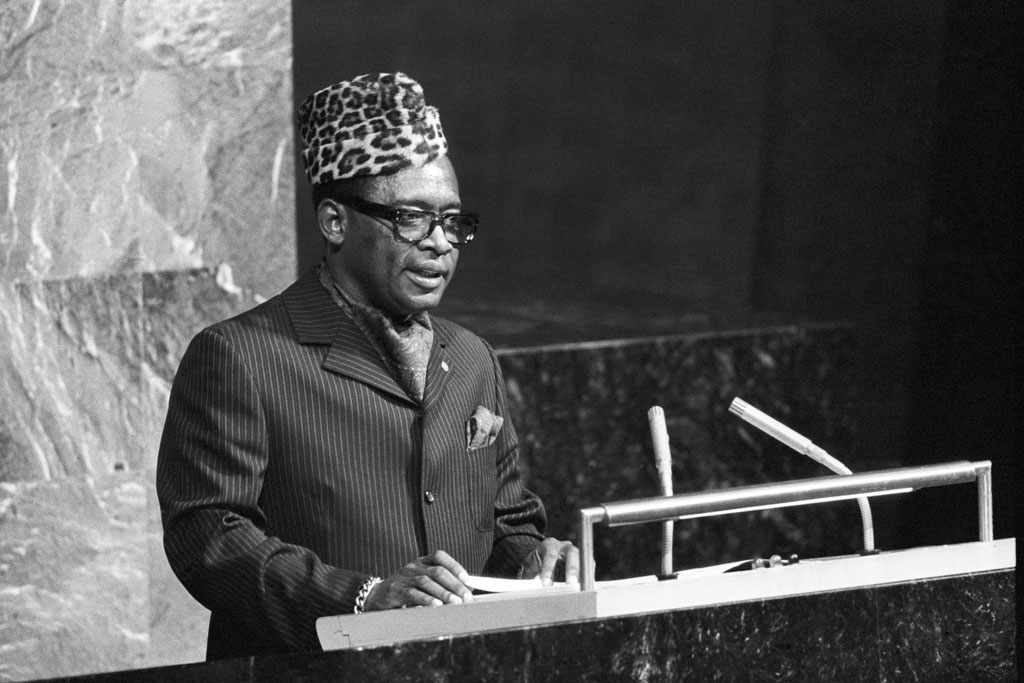
04 October 1973 – In 1972, as part of a so-called authenticity campaign linked to Congolese culture, President Mobutu changed his name and that of his country. Renamed Mobutu Sese Seko Kuku Ngbendu Wa Za Banga (approximate translation: “the all-powerful warrior who, because of his endurance and inflexible will to win, goes from conquest to conquest, leaving fire in his wake”) and his country now called Zaire, the President addressed UN Member States during a meeting of the General Assembly at UN Headquarters in New York. UN Photo/Yutaka Nagata
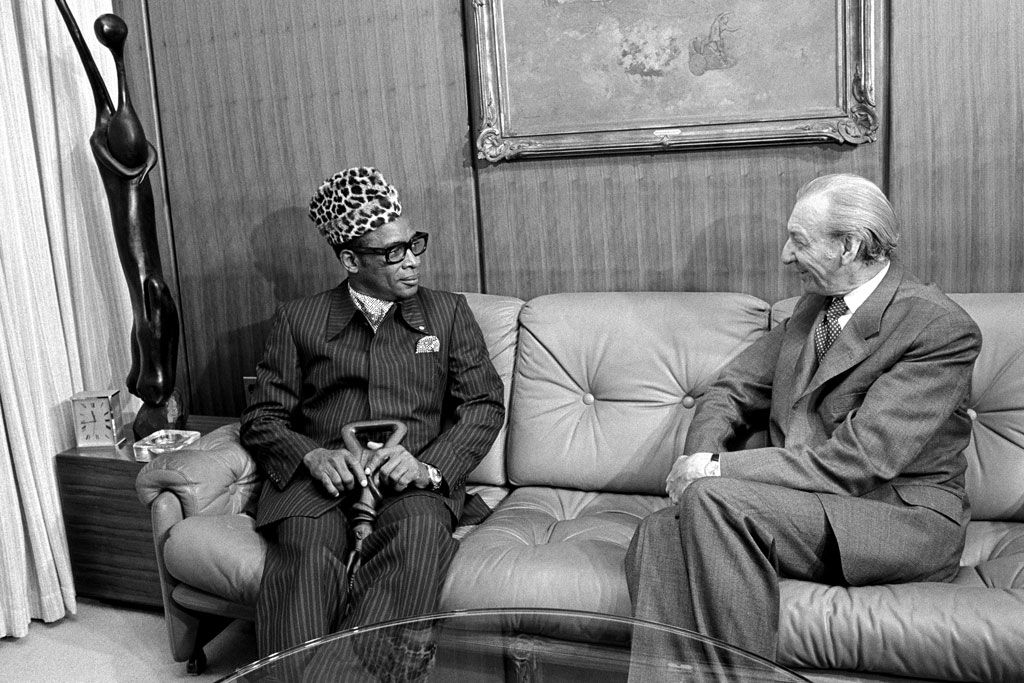
14 September 1979 – After some three decades of rule, President Mobutu was to go into exile in 1997 following a foreign-backed rebellion in the country’s east. He died of prostate cancer later that year in Morocco. His time in office is considered by many a period of corruption and mismanagement, with the country regressing on many areas of development. The country’s new leader re-named it the Democratic Republic of the Congo, and UN peacekeepers were to return in the late 1990s following further rebellions and violence. Shown here, President Mobutu meets with UN Secretary-General Kurt Waldheim during one of his latter visits to UN Headquarters in New York. UN Photo/Saw Lwin
Tshombe was not stupid, but he desperately wanted to be liked and recognized. He tended to agree with the last person he had talked to and could be counted on to go back on any agreement as soon as he had seen his next visitor. He was also an accomplished hypochondriac, using feigned ill health to avoid answering awkward questions. “J’ai mal à la gorge, Monsieur Urquhart,” he would suddenly whisper. “Je dois prendre immédiatement une piqûre." [Transl: “I have a sore throat, Mr. Urquhart," he would suddenly whisper. "I must immediately get a (medical) shot.”] And that would be the end of the conversation.
Tshombe was basically a weak person who was always being manipulated by others--the Union Miniere, right-wing politicians in Europe and the United States, mercenaries, arms dealers and other adventurers who were after his money. The most exotic of the arms dealers was Colonel Hubert Fauntleroy Julian, the “Black Eagle of Harlem," whom we detained on his arrival in Elizabethville. Among Tshombe’s many manipulators was Moral Rearmament, a cult which had given itself a mission to rescue Africa. Despite my entreaties, Tshombe left for a Moral Rearmament conference in Brazil at a particularly dangerous moment, leaving his affairs in the hands of his far more extreme and irresponsible colleagues, who quickly precipitated two weeks of fighting between the UN and Tshombe’s mercenary-led militia. We eventually won, and Tshombe agreed to send his deputies to the central parliament in Leopoldville.
After the fighting, I saw a lot of Tshombe. Having been beaten in the field, he was at his most reasonable, and also his least convincing. He even arrested Colonel René Faulques, the chief French mercenary, and asked me to come and witness his execution. I told Tshombe that this idea was both barbarous and foolish, and Faulques was expelled to Northern Rhodesia.
Tshombe’s first priority was to restore the Third Empire splendor of his presidential guard, whose helmets, swords, and costumes had been looted by hostile tribesmen during the fighting. I asked UNESCO what hope there was of finding period helmets and costumes in the opera houses of the world. None at all, they replied, as Third Empire productions were now all the rage. But, they added helpfully, due to Wieland Wagner’s new, un-costumed productions at Bayreuth, traditional Wagnerian costumes were now out of fashion, and there was a healthy worldwide surplus of horned helmets and spears. I resisted this temptation.
My main objective was to get Tshombe to make his peace with the central government of Congo and end the secession. I told him that if he did this, he might well one day become prime minister of the whole country, which he did just two years later. By the time I left Katanga in March 1961, I believed we were on the right path to ending the Katanga secession peacefully. Unfortunately, I had underestimated Tshombe’s capacity for going back on agreements, and it took nearly another year and a new round of fighting provoked, inexplicably, by Tshombe’s own militia, to bring about the end of the secession. Tshombe became prime minister of a unified Congo in 1964, but was toppled by a mercenary-led insurgency in 1965, a year after the UN had left the Congo.
Tshombe went into exile in Spain, where his Swiss bank account allowed him to live in state. The Spanish government gave him an escort of two Civil Guards with swords and three-cornered patent-leather hats. But someone – Mobutu? The CIA? Other African states? – wanted him still further out of the way.
In 1967, Tshombe was approached by Francis Bodenan, a Frenchman accused of a double murder in France and posing as an admirer who wanted to make Tshombe the head of a world youth movement. Tshombe was immensely gratified and, persuaded by a carefully planned campaign of flattery, he agreed to fly in Bodenan’s plane to Ibiza to look at possible headquarters for the movement. After take-off, Bodenan ordered the British pilot at gunpoint to change course for Algiers. Seeing the gun, the Civil Guards drew their swords, not a very useful move in a Lear jet. The British pilot managed to broadcast a Mayday signal, so the whole press corps was at the Algiers airfield to witness and report on what was supposed to have been a secret arrival. The world knew the story, but no one cared enough to try to persuade the Algerians to release the former President of Katanga and Prime Minister of Congo. As far as I know, no one has ever established whom Bodenan was working for.
Tshombe lived out his last two years in a guarded but luxurious compound reserved for important Algerian political prisoners. When he died of heart failure in 1969, there was an unseemly squabble over his Swiss bank account.
Mobutu’s career would not have been possible without the CIA and full U.S. support, and he wrecked his country. Tshombe’s secession would not have been possible without the greed of the Western mining consortiums, the scheming of the Belgian government, and the anti-communist obsessions of myopic conservative politicians on both sides of the Atlantic. Both men addled the promise of Congolese independence at a time when there was still at least a slim chance of its success.

